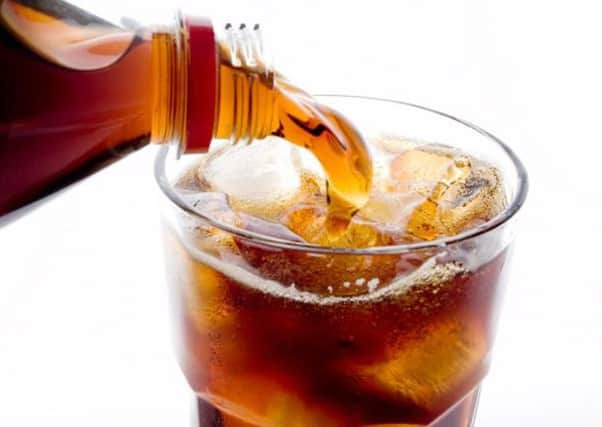YOUR SAY: Doctors urge 20p tax on sugary drinks
This article contains affiliate links. We may earn a small commission on items purchased through this article, but that does not affect our editorial judgement.


What do you think? Have your say below, or comment on our Facebook page
The British Medical Association (BMA) said imposing the tax could reduce the prevalence of obesity in the UK by around 180,000 people.
Advertisement
Hide AdAdvertisement
Hide AdWith a third of the population projected to be obese by 2030, it also wants to see all the free schools and academies adhere to the same “strict food regulations” currently in place in state schools as well as improve teaching about cooking and healthy eating for pupils.
Its report, Food For Thought, warns that poor diet costs the NHS around £6 billion a year, meaning it has a greater impact on its budget than alcohol consumption, smoking or physical inactivity.
“In the UK, the traditional public health challenges of undernutrition and unsafe food and water have been largely replaced by the risks of poor diet,” the report says.
The BMA is the latest body to call for a tax on sugar, a move that was ruled out by Health Secretary Jeremy Hunt last year.
Advertisement
Hide AdAdvertisement
Hide AdA recent report by the Food Research Collaboration (FRC), which is chaired by Professor Tim Lang of the Centre for Food Policy at City University London, said the Government should stop living in a ”fantasy world” and consider taxing unhealthy products.
The report said academic research found the healthiest diets cost double the price of the least healthy ones, and while the price of unhealthy foods has been shown to be decreasing over time, the gap between the price of healthy and unhealthy foods is widening.
The BMA’s report suggests that imposing a minimum 20p tax on all non-alcoholic water based beverages with added sugar, including sugar-sweetened soft drinks, energy drinks, fruit drink, sports drinks and fruit-juice concentrates, could subsidise the sale of fruit and vegetables.
It said it would also like to see a ban on all marketing of unhealthy food and drink products to children and young people, adding that a “particular area of concern is the proliferation of marketing online and via social media”.
Advertisement
Hide AdAdvertisement
Hide AdThe report said various mass-media public health campaigns aimed at promoting healthier diets have been found to be “ineffective” in the past.
It also criticises the Government for placing too much emphasis on industry involvement in developing food and nutrition policy in the UK through the use of public-private partnerships, as it said it has led to a “disproportionate focus on personal responsibility and voluntary action by industry, which has delivered limited or negligible public health gains”.
It said the approach of partnership working has also provided a platform for companies to promote and enhance their own brands, meaning that commercial companies are the main beneficiaries.
The report’s author, BMA’s board of science chairwoman Professor Sheila Hollins, said: “Doctors are increasingly concerned about the impact of poor diet, which is responsible for up to 70,000 deaths a year, and has the greatest impact on the NHS budget, costing £6 billion annually.
Advertisement
Hide AdAdvertisement
Hide Ad“While sugar-sweetened drinks are very high in calories they are of limited nutritional value and when people in the UK are already consuming far too much sugar, we are increasingly concerned about how they contribute towards conditions like diabetes.
“We know from experiences in other countries that taxation on unhealthy food and drinks can improve health outcomes, and the strongest evidence of effectiveness is for a tax on sugar-sweetened beverages. If a tax of at least 20% is introduced, it could reduce the prevalence of obesity in the UK by around 180,000 people.
“We know that the majority of the UK population, particularly low income households, are not consuming enough fruit and vegetables, so financial measures should also be considered to subsidise their price, which has risen by 30% since 2008.
“This is an important way to help redress the imbalance highlighted previously between the cost of healthy and unhealthy products, which particularly impacts on individuals and families affected by food poverty.
Advertisement
Hide AdAdvertisement
Hide Ad“Children’s diets are easily influenced, so regulating the food provided in schools, and providing free fruit and vegetables in primary schools, is an important way to support healthier diets among children and young people. All academies and free schools must be subject to the same mandatory standards as state schools, as without them they are more likely to provide cheaper, poorer quality food.”
British Dental Association chairman Mick Armstrong said: “Health professionals are speaking with one voice. It’s time Government policy recognised the singular threat sugar represents to public health.
“It’s time for a real co-ordinated effort to wean Britain off its addiction to sugar. That means discouraging consumption and giving manufacturers a real reason to cut the dose.”
But Rob Lyons, campaigns manager for the consumer group Action on Consumer Choice, described the idea of taxing sugar as a type of “social engineering”.
Advertisement
Hide AdAdvertisement
Hide Ad“Sugar taxes, health warnings and other proposals to curb our sugar consumption will have little impact on people’s health because sugary foods only make up a small proportion of our diet,” he said.
“The proposals are regressive because their impact is based entirely on consumption, not the means to pay, so they will have a disproportionate impact on those on lower incomes.
“They are also illiberal because government has no business dictating what or how much consumers should eat and drink.”